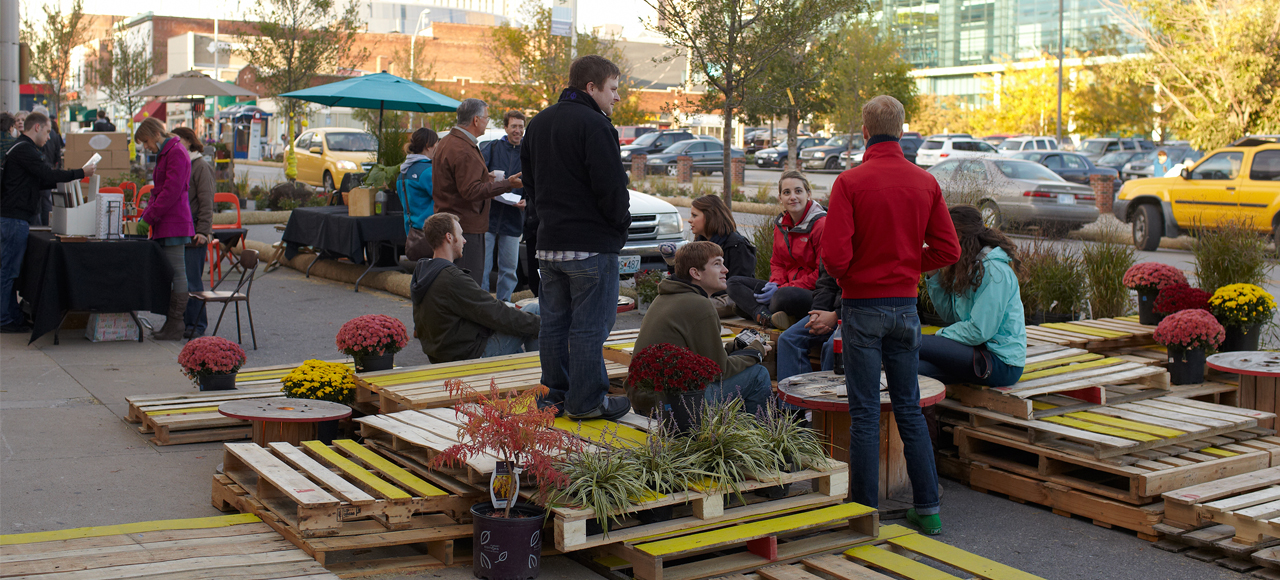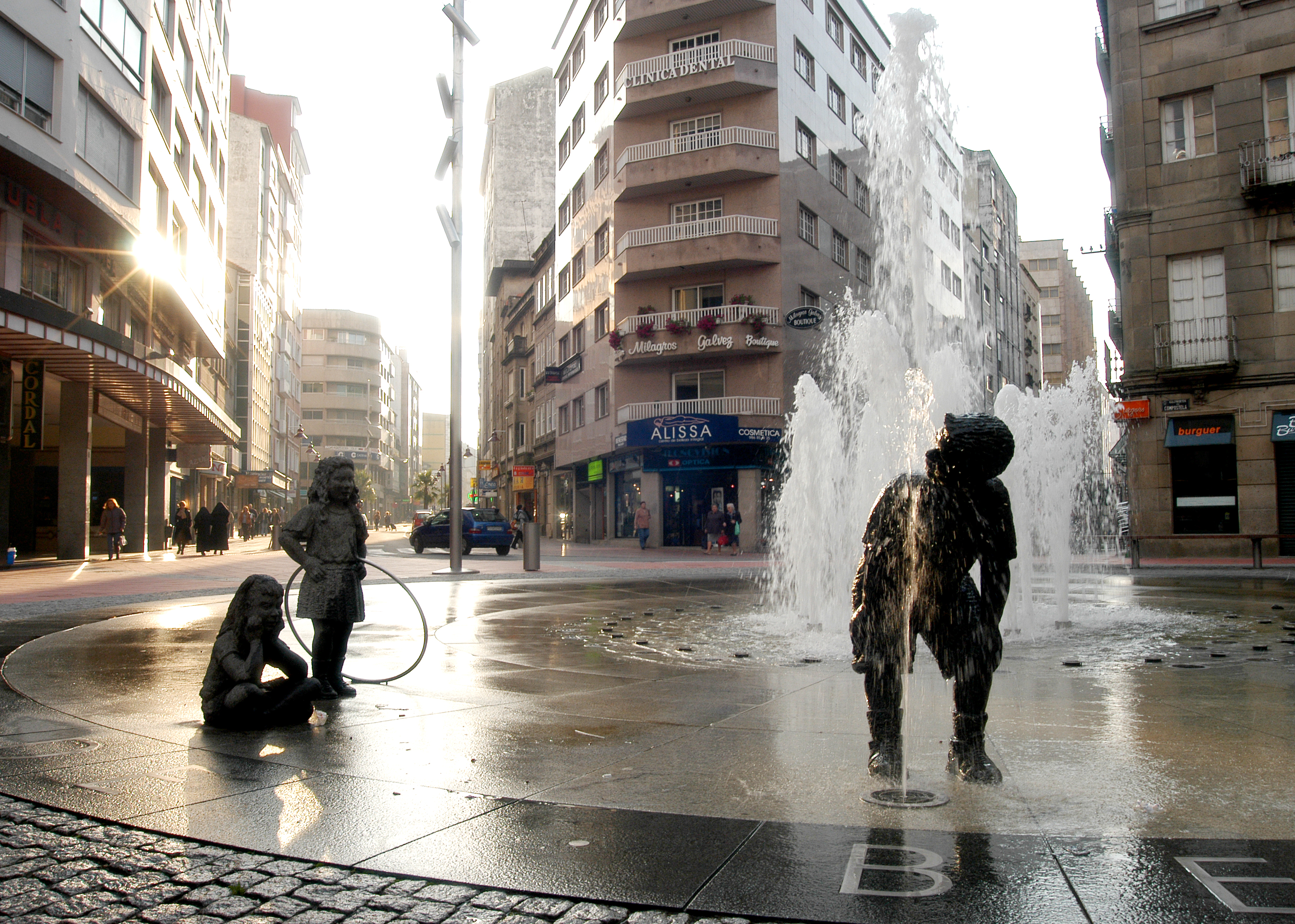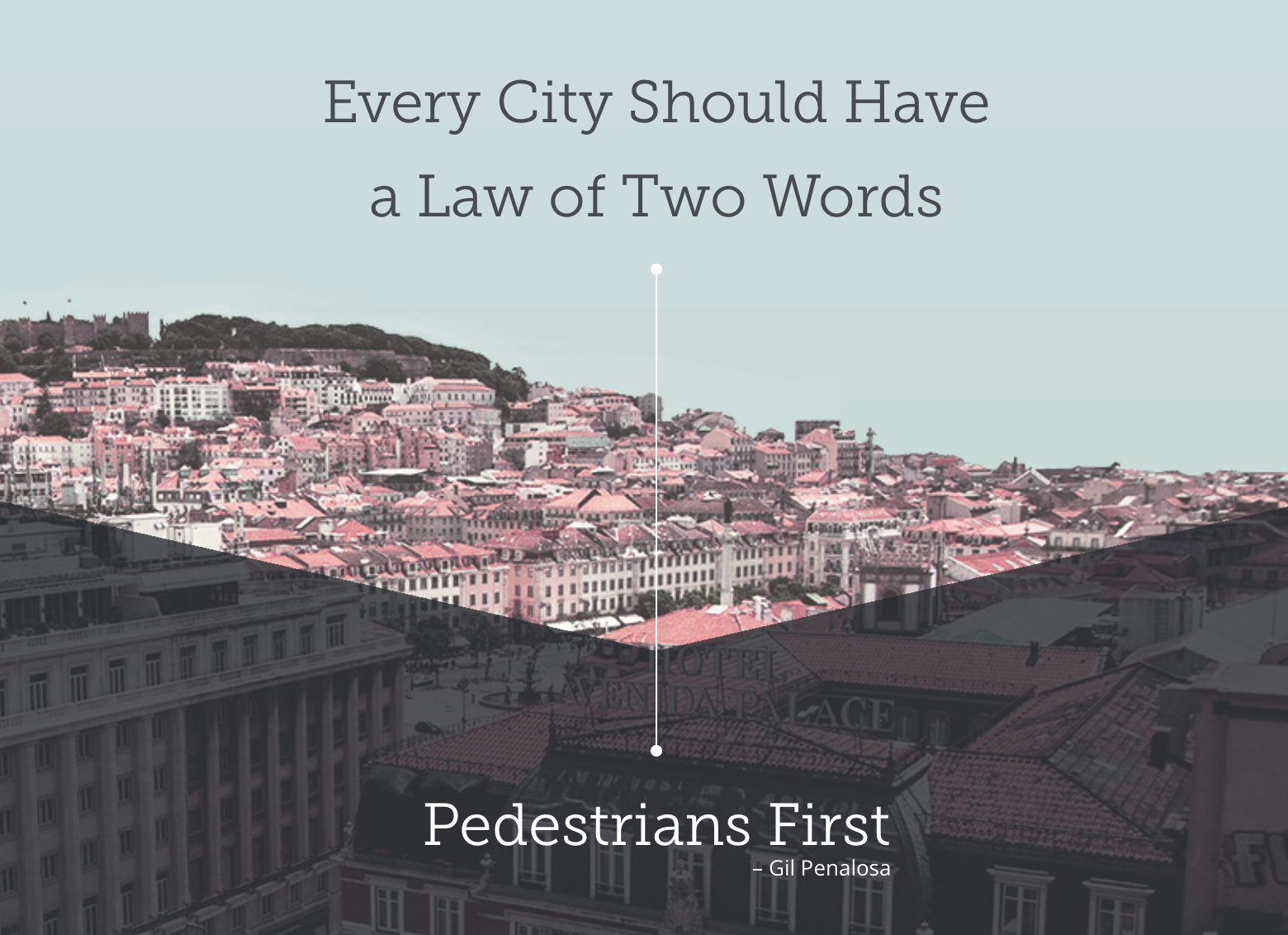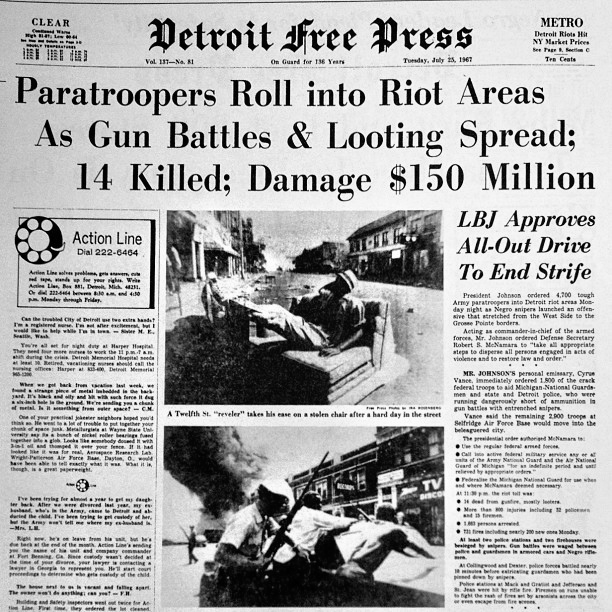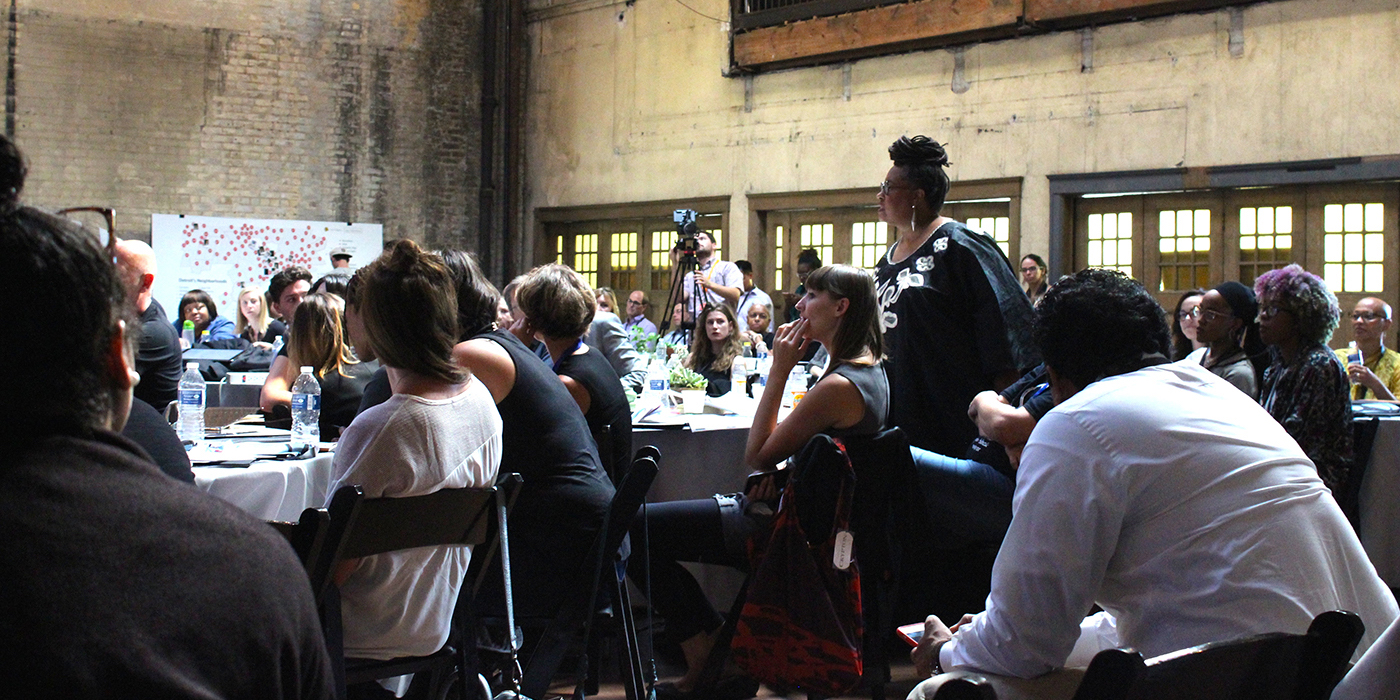To support International Women’s Forum two-day Executive Development Roundtable workshop with the goal of enhancing the leadership capacity of Miami’s rising women entrepreneurs and civic innovators.
Program Area: Community Impact
To promote civic engagement and broaden access to information by funding Community Foundation of SE Michigan to implement the On the Table model, which brings residents together to discuss local community issues.
Suzanne Nienaber is partnerships director at the Center for Active Design, which Knight Foundation supports to develop strategies that use design to encourage participation in civic life.
Can park enhancements encourage greater interaction with neighbors? Can community beautification inspire ongoing acts of stewardship? Can arts and cultural resources help stimulate a sense of civic trust?
These are just a few of the questions that the Center for Active Design is exploring through Assembly, a pioneering initiative to leverage place-based design as a pivotal tool for enhancing the civic life of communities. Assembly is using a multipronged approach to investigate the relationship between place and civic engagement—including an in-depth literature review, data analysis, original experiments, project case studies, and input from a diverse panel of expert advisers.
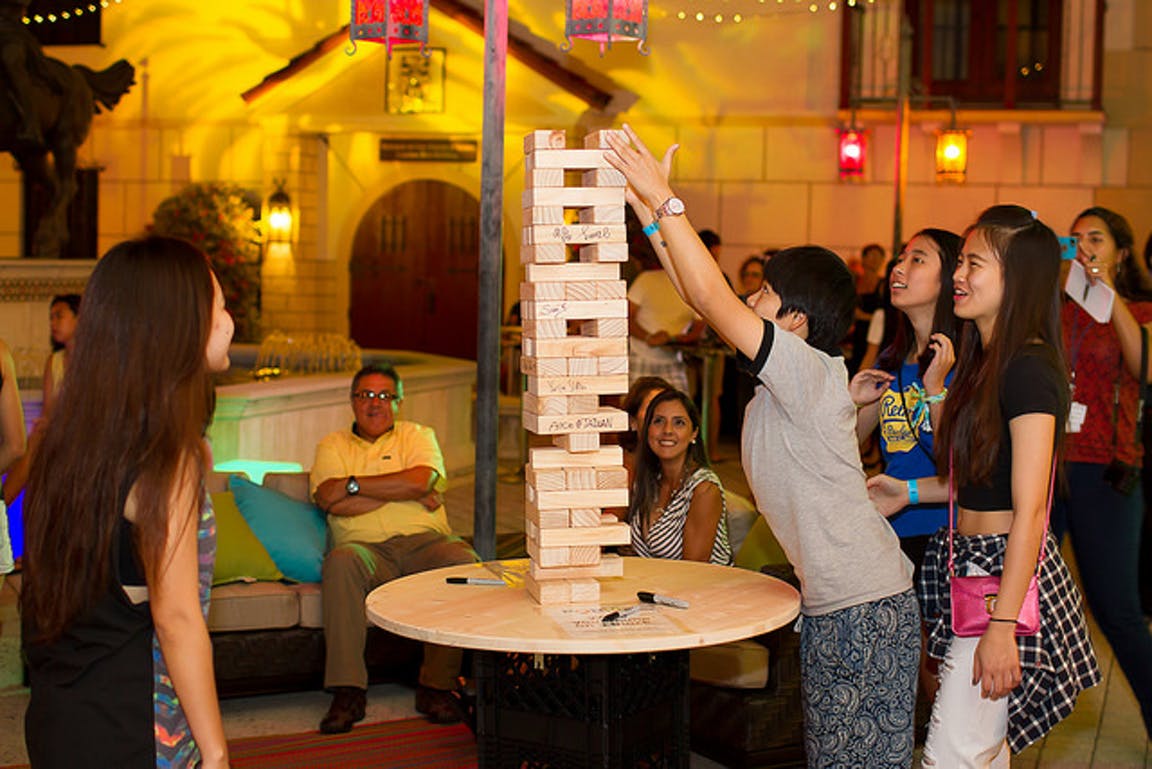
Our research team explored this trove of data by analyzing select survey questions related to Assembly’s four civic engagement objectives: 1) civic trust and appreciation; 2) participation in public life; 3) stewardship of the public realm; and 4) informed local voting. Responses were measured in relation to four key survey variables that illuminate qualities of place:
- Availability of outdoor recreation space.
- Perceived community beauty.
- Access to arts and culture.
- Availability of community events.
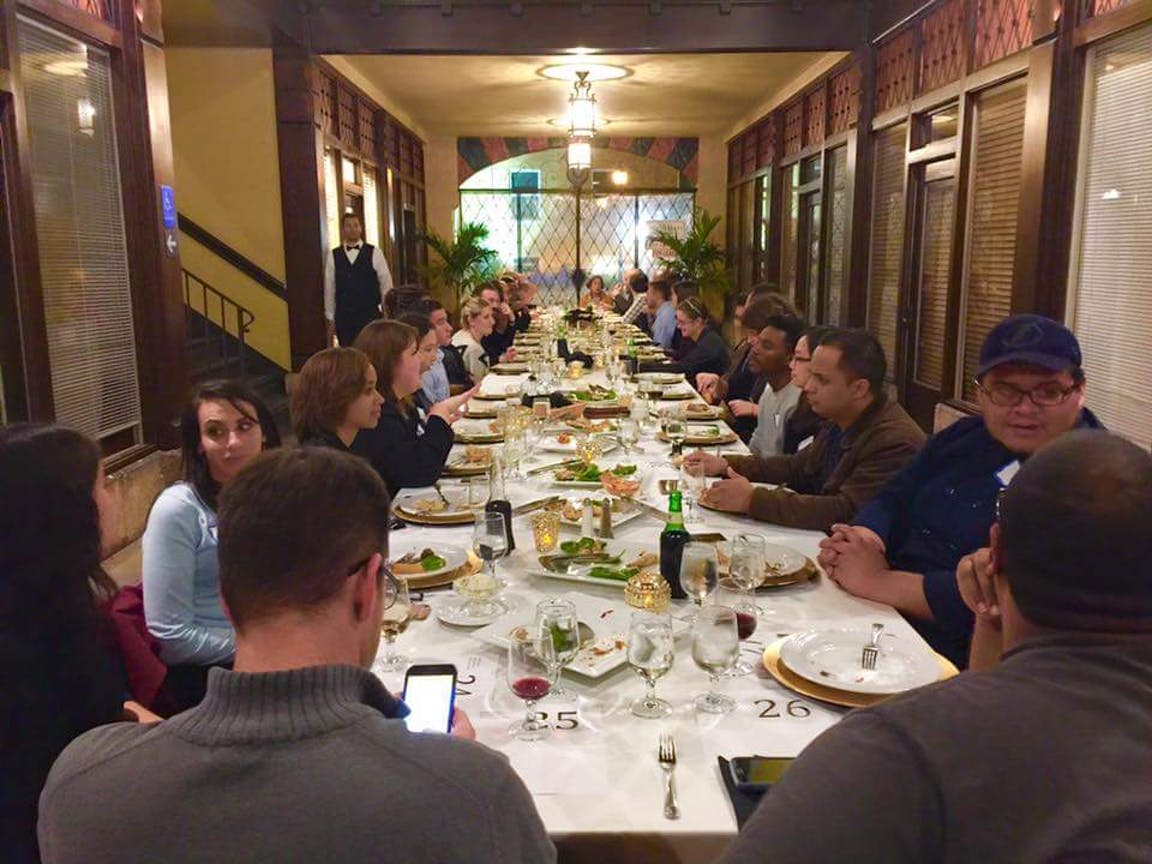
The analysis revealed that these four independent variables have a strong and statistically significant association with a range of civic engagement outcomes, even when controlling for individual and city-level characteristics. These findings provide a solid baseline of understanding for pursuing deeper investigations into the impacts of place-based design strategies. For example:
- When examining measures of civic trust, we found that people who report an abundance of outdoor recreation space in their community are 28 percent more likely to think local leaders do a good job representing their interests. They are also 27 percent more likely to have a positive view of local police, compared to people who report little access to outdoor recreation space.
- Analysis of participation in public life showed that respondents who live in a place they think is beautiful are 14 percent more likely to attend local events, and 9 percent more likely to interact with neighbors compared to those who do not perceive their community as beautiful.
- An exploration of stewardship measures found that people who have good access to arts and culture in their communities are 14 percent more likely to believe they can have an impact on their community, and 12 percent more likely to donate money to a local organization compared to those who do not have access to the arts.
- Our analysis did not reveal a consistent relationship between qualities of place and local voting. However, we will continue to explore this topic further through original research efforts.
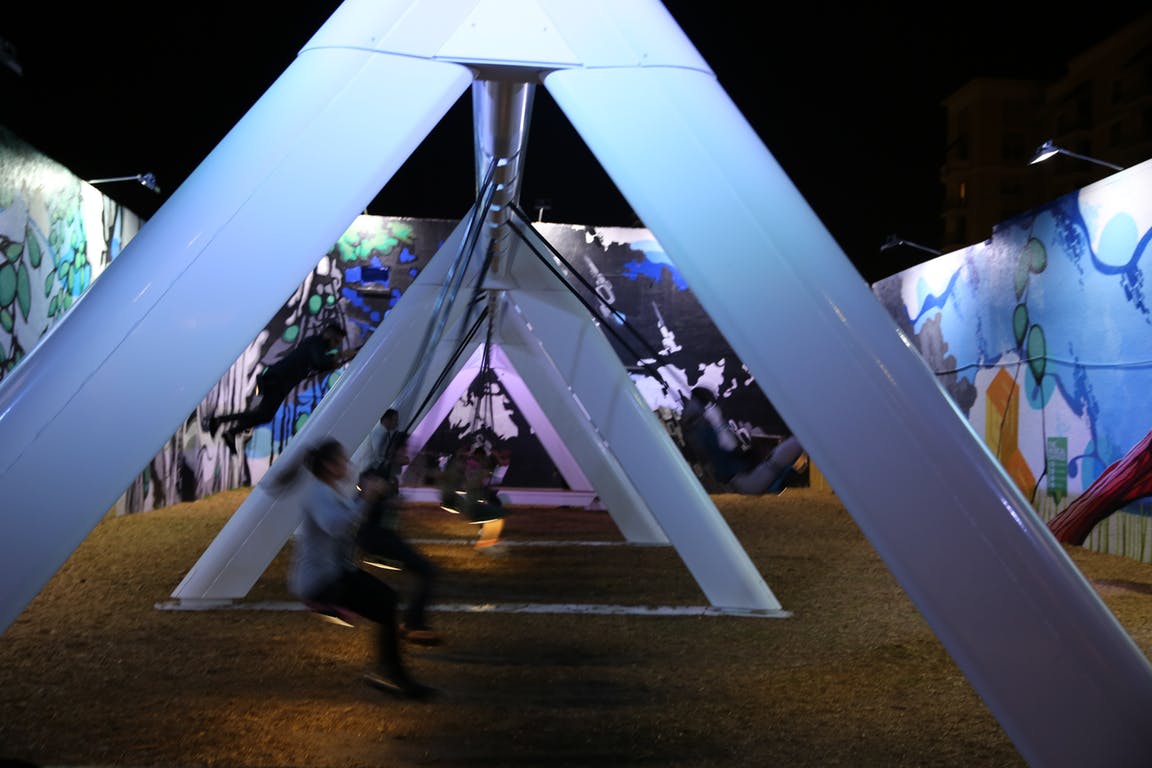
Further details can be found in the research brief, which is available for free download. These exciting findings establish confidence that there is, indeed, an inherent relationship between qualities of place and civic life. However, more research is needed to understand causation. Do good places help create good citizens? Or do good citizens help create good places? Stay tuned for more details, as the Assembly initiative continues to explore these questions through an upcoming large-scale survey with embedded survey experiments, and local field experiments. We will ultimately translate the findings into a set of practical, evidence-based design guidelines to support civic life, which is scheduled for publication in 2018.
To receive updates on Assembly, join the Center for Active Design mailing list at centerforactivedesign.org/subscribe.
-
Community Impact / Article
-
Community Impact / Article
-
Community Impact / Article
-
Community Impact / Report
- Doable CityExternal Content / Website
Hajj Flemings is CEO and founder of Brand Camp University, a winner of Knight Foundation’s 2015 Knight Cities Challenge. On Dec. 1, Brand Camp University launched Rebrand Detroit Stories, a multiplatform series about the people behind the resurgence of Detroit.
In 2011, I was featured on CNN’s “Black in America 4: The New Promised Land Silicon Valley” documentary. I was one of seven entrepreneurs selected to live in Silicon Valley and build a startup while Soledad O’Brien chronicled our story. That experience enlightened me about the dangers of meritocracy and the lack of access to opportunity and technology in disconnected and diverse communities. Meritocracy rewards people with success based purely on talent and effort, ignoring other factors such as race or social class. Some argue that meritocracy is the purest form of fairness, but in practice the falsity of this claim can be shown time and again, including in Detroit; access to opportunity may be nonexistent and bias often has a way of stifling prospects for success. In Detroit’s transformation, we see stories of non-diverse business owners in Midtown and Downtown Detroit that ignore the entrepreneurs in neighborhoods. Our goal is to help create a city that is a place for all people. This was the catalyst of my Rebrand Detroit project.
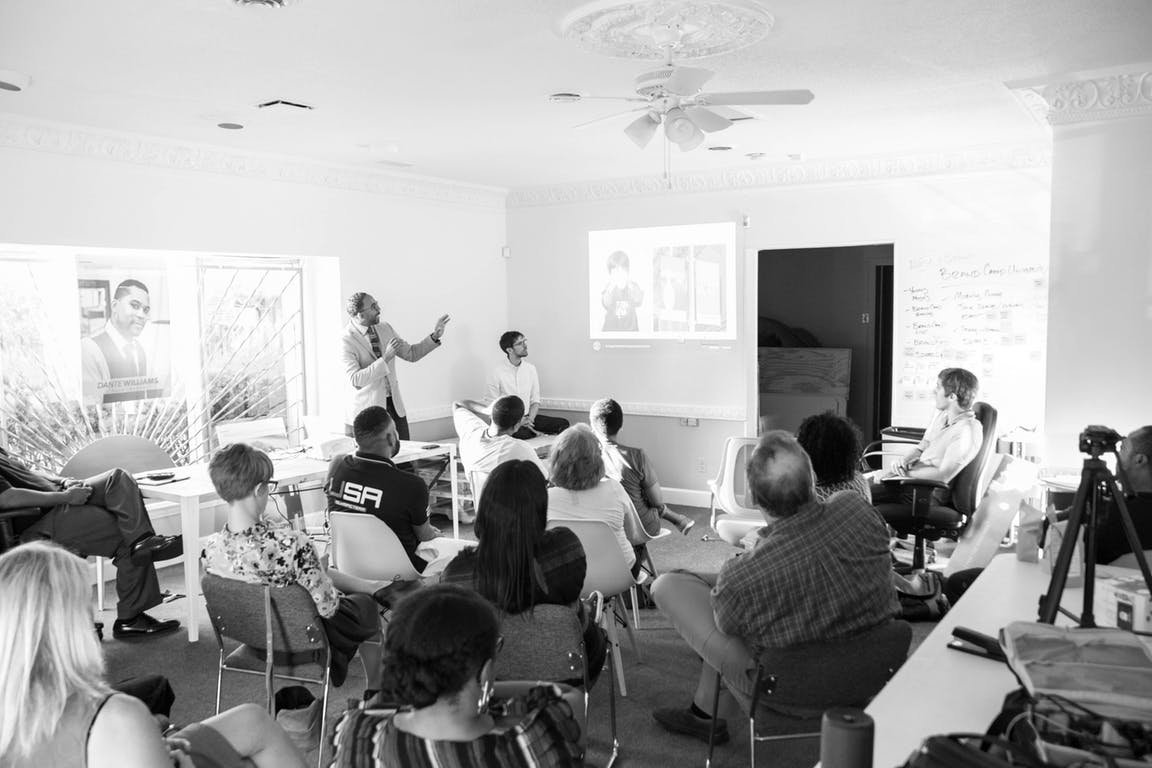
I started my Knight Cities Challenge project with high aspirations fueled with passion to empower neighborhood businesses. I felt like I was ready to change the world. I quickly began to realize that factors outside of my control—city infrastructure, traffic patterns and the lack of foot traffic to name a few—were huge obstacles. We decided to pilot an idea with the existing project, that didn’t require the above factors for success. We worked with five neighborhood businesses through two cohorts of Rebrand Detroit as a part of the project. Through this process two initiatives emerged: “Rebrand Detroit Stories,” where we create professional photographs, video content and stories for businesses with no marketing budget, and “The 100 Project,” an effort to help businesses build a digital footprint.
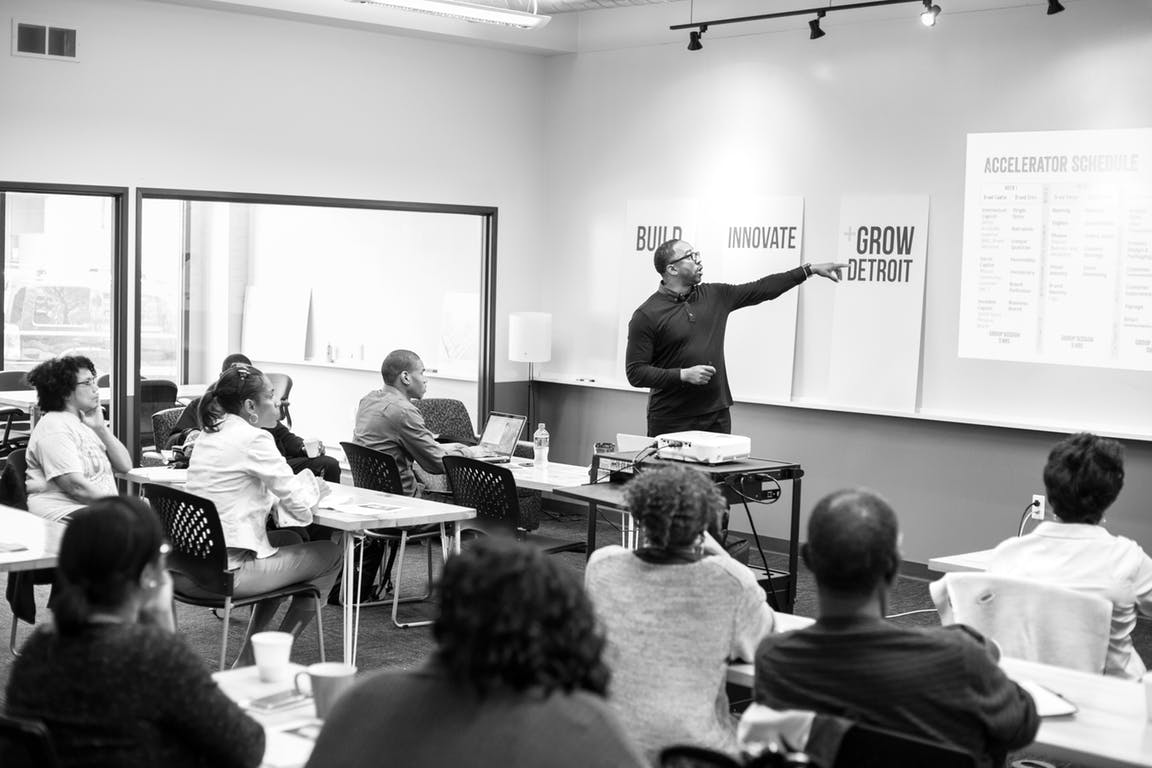
Rebrand Detroit Stories
We launched Rebrand Detroit Stories earlier this month at Pages Bookshop in the Grandmont Rosedale neighborhood. It is an original series, a collection of stories, short films, talks and experiences of Detroiters who are fueling the city’s resurgence. This series takes a look behind the scene of our city and introduces people to everyday residents whose hustle, resilience and passion are changing the place they live, work and play. These stories showcase the work people are doing in neighborhoods across the city, from Grandmont Rosedale, to West Village, to the Hope District and beyond. We help tell the stories of Detroiters who refuse to accept the misguided national narrative that Detroit will always be a bankrupt city. We believe that a city’s people are at the heart of its brand, and these creative pieces aim to inspire residents to help build a city for everyone.
The 100 Project
One of the learning outcomes of my Rebrand Detroit project is the lack of digital strategy and online presence for businesses in Detroit neighborhoods. Our research shows 46 percent of the small businesses in America operate without a website, a national problem that we believe can drive economic impact in urban cities if we turn that number around. We piloted The 100 Project earlier this fall to make brick-and-mortar small businesses in Detroit digitally visible. We want to put 100 Detroit neighborhood businesses on the internet with their own websites. It might seem like a small step, but it can have big results. A website is a piece of digital real estate that is the gateway to a business. In the digital age, it’s necessary for credibility; there is instant validation when you are able to provide a potential customer with a URL or when someone can search in Google Maps to find your restaurant. The fact that 81 percent of people research a business online before making a purchase shows how critical a website is to business success.
What’s next?
Though The 100 Project is based in Detroit, we’re branching out with our work. We have completed four websites in 30 days: Motor City Java (Detroit), The Garden Bug (Detroit), Blackstar Hardware (Philadelphia, another Knight community) and Sun May Company (Seattle). We’re piloting the idea in even more cities. We selected Philadelphia and Miami as our next city hubs because we have strong relationships with those communities through Knight Foundation and Venture for America. Currently WordPress, which is powered by Automattic, has driven The 100 Project with support from developers, website tools, themes and premium business packages for free. We are working with Venture for America Detroit and its Detroit Fellows on two websites, which will help us evaluate next steps. We’re looking forward to seeing the project gain momentum and to helping not just rebrand Detroit, but to rebrand cities across the country through the power of their engaged citizens.
For more about Rebrand Detroit Stories, visit RebrandDetroit.co/stories. For more about The 100 Project, visit RebrandDetroit.co/100project. Follow @HajjFlemings and @rebranddetroit on Twitter.
-
Community Impact / Article
-
Journalism / Article
-
Journalism / Article
-
Journalism / Article
-
Arts / Article
-
Community Impact / Article
In Philadelphia, there is certainly no shortage of musical talent. Countless aspiring electronic musicians, practiced instrumentalists, beat makers, producers and MCs call the city home, and they might even be your neighbors. These individuals contribute to a supportive community full of music lovers, venues and studio spaces that comprise the foundation of Philly’s wide auditory spectrum. Discovering the music is oftentimes the easy part, though. Finding one’s own footing in a competitive world means that even the support structures need reinforcement.
Enter the Institute for Hip Hop Entrepreneurship. As a winner of the Knight Cities Challenge, the institute–a product of Little Giant Creative‘s Tayyib Smith and Meegan Denenberg–has made it its mission to help aspiring music makers help themselves. By offering informational sessions and firsthand experience from inside the often tricky and meandering music business, organizers hope to provide Philadelphia’s present and future talent with the means to turn their dreams into reality.
A nine-month program begins by recruiting promising locals between the ages of 18 and 32. From a pool of more than 300 applicants, the inaugural class of 24 students was selected to kick off the program this year. From here, students are offered the opportunity to attend seminars with creative professionals, business leaders and members of the technology and music industries. Each weekend-long session focuses on a different aspect of building a business, such as marketing plans, staffing and fundraising, and the result is a cohesive framework with which these up-and-coming innovators can expand to fit their own unique needs.
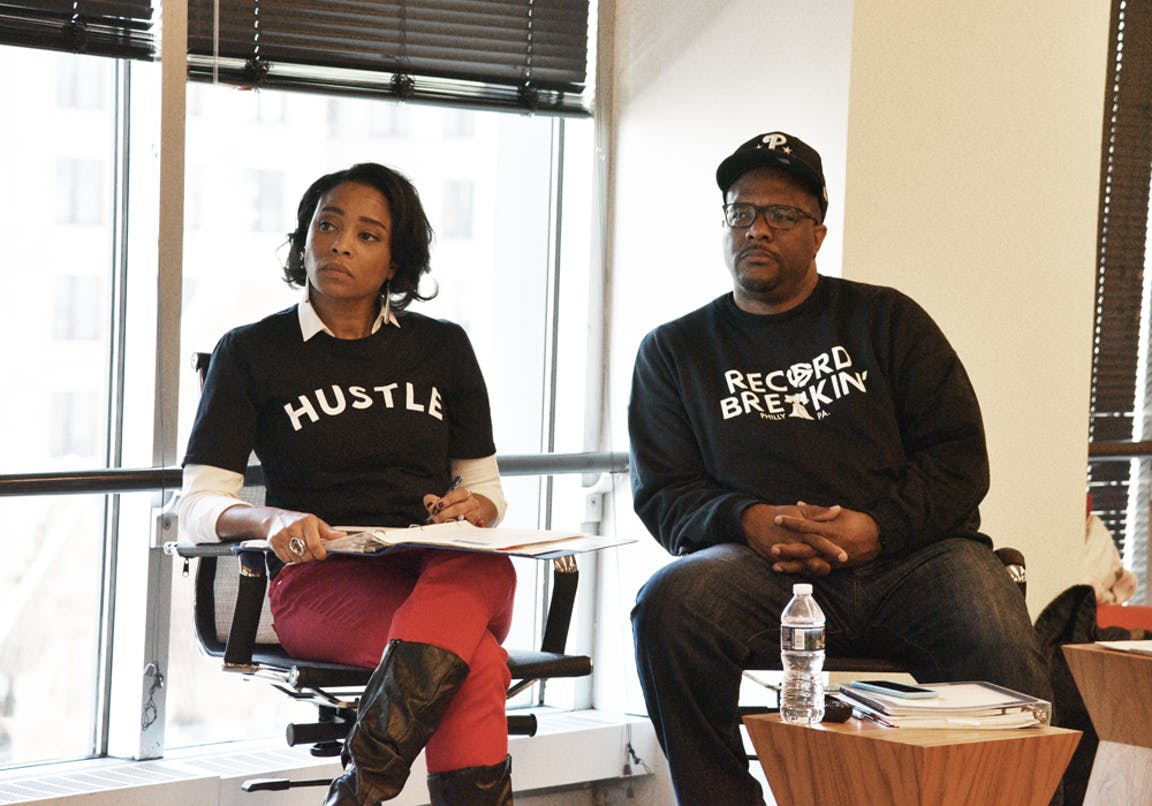
Over the weekend of Nov. 12 and 13, the institute hosted its inaugural weekend downtown at Center City’s Pipeline co-working space. In attendance were Philly musicians Bahamadia and Yusuf Muhammad, as well as Grammy award-winning producer and former co-owner of Ruffhouse Records Joe “the Butcher” Nicolo, music writer Brian Coleman, and Wurd Radio CEO/President Sara Lomax-Reese. Discussions were had about what it takes to be a business leader, how to come up with unique concepts, as well as ideas about collaboration and risk-taking. Lomax-Reese even provided the group with mindfulness techniques like meditation for when the going inevitably gets tough.
The institute’s workshops call on a variety of academics and notable names in hip-hop to meet the students head-on each month, supplying them with helpful insights and training that will set them on course to become musical and entrepreneurial leaders themselves. By meeting these ambitious, nontraditional youth who are frequently denied access to such resources halfway, the program gives them the opportunity to gain important skills like brainstorming, creating business plans, and measuring the social impact of their work.
The next installment of workshops will take place on Dec. 10 and 11, and the themes in this class will explore ‘disruptive leadership.’ Students will learn to identify qualities that leaders possess that allow them to spark innovation and shake things up a bit. For the December lineup, participants can expect to hear from founder of renowned site AllHipHop.com Grouchy Greg Watkins, founder of Penalty Records/Penalty Entertainment Neil Levine, producer of Pandora’s Questlove Supreme podcast Laiya St. Clair, and Coded by Kids executive director Sylvester Mobley.
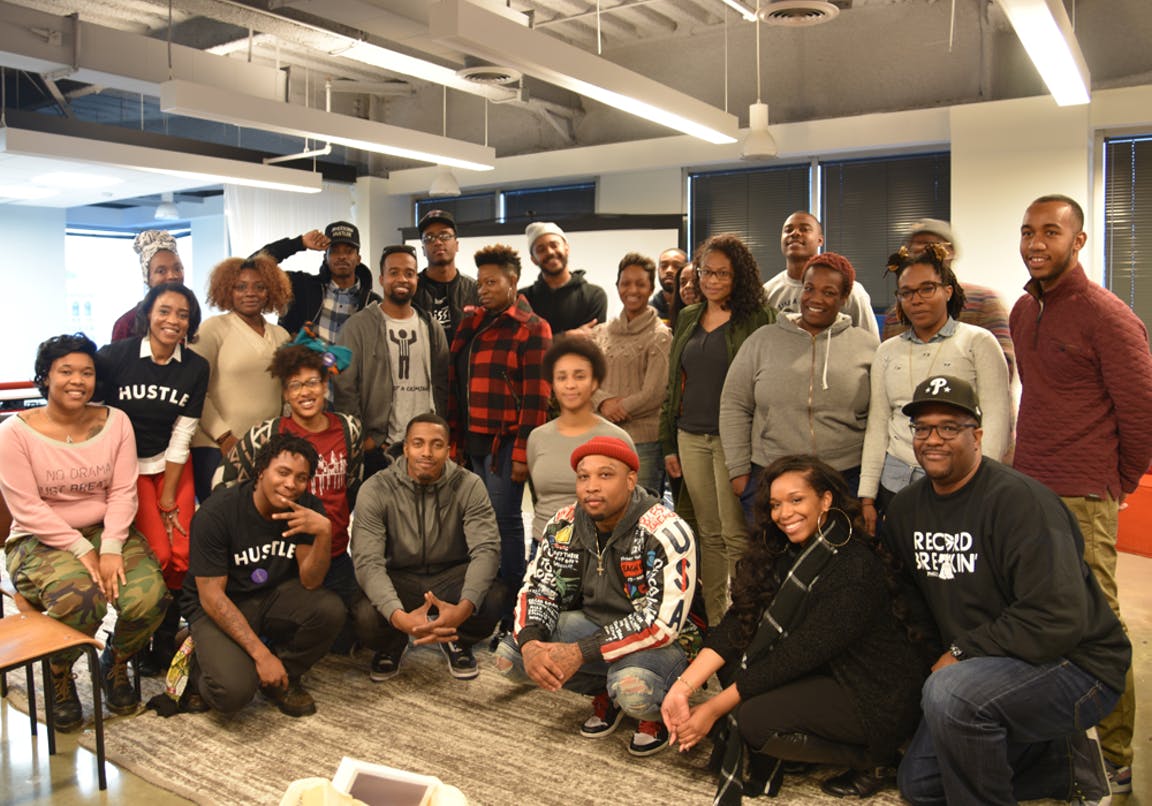
Although the leadership of the Institute of Hip Hop Entrepreneurship will be the first to admit that they don’t have all the answers, they are strongly invested in the idea of providing a safe environment for young creatives to gather and talk about their experiences with professionals and one another.
“The next generation of great leaders needs to come from underrepresented communities,” says co-founder Meegan Denenberg. “Far too often, young people with real ambitions are overlooked by existing educational and business communities and programs. Our goal is to create graduates with the skills, confidence and networks to be successful in Philadelphia’s wider business community.”
Marking the end of a busy six-month-long build-up full of planning and recruitment, the institute has jumped onto the scene in a big way with the start of its weekend seminars, but this is where the work really begins. Now that these fresh, fertile minds have had a chance to meet and collaborate, the growth and experimentation can begin. The Institute of Hip Hop Entrepreneurship provides the vehicle for these ambitious young individuals, but they are the ones behind the wheel. The destination is up to them.
Chip Schwartz is a Philadelphia-based freelance writer. Email him at [email protected].
